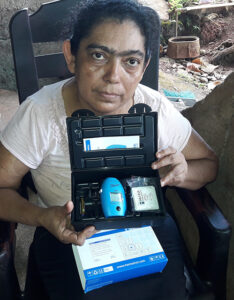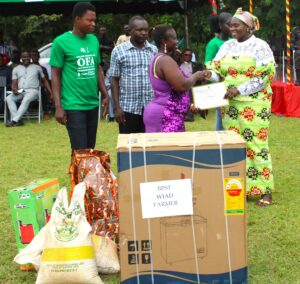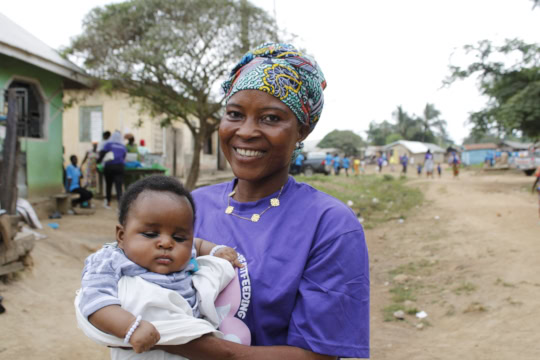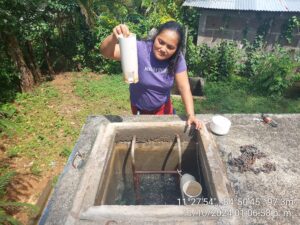Measuring Chlorine Levels in Water Vital for Communities
 Access, availability and water quality in developing countries in Latin America, are important matters for the population, especially in rural areas. In Nicaragua, the Drinking Water and Sanitation Committees (CAPS) assume the task of supplying water to the people of their communities, managing the rural aqueducts. However, the Ministry of Health (MINSA) recognizes that some water supply or systems are often contaminated.
Access, availability and water quality in developing countries in Latin America, are important matters for the population, especially in rural areas. In Nicaragua, the Drinking Water and Sanitation Committees (CAPS) assume the task of supplying water to the people of their communities, managing the rural aqueducts. However, the Ministry of Health (MINSA) recognizes that some water supply or systems are often contaminated.
Water quality is the main problem which has a direct impact on the health of the population. According to the public health center, about 80% of health problems like diarrhea, conjunctivitis and skin problems, are linked to water.
Self-Help International is committed to help educate and generate the self-sufficiency to communities and CAPS members by providing comprehensive technical advice to maintain the purification of water in rural communities. The Clean Water Program provides CAPS members with technology to measure the concentration of chlorine in the water. This allows the directors and leaders of the CAPS to know exactly the necessary amount of chlorine that the water must contain to eliminate the contaminating microbes so that water is safe for human consumption.
What exactly are chlorine meters?
 The HANNA Instrument brand meters are electronic devices that work with a small AAA battery to measure the parameter “residual chlorine” which is present in the water. The small device fits in a pocket and is easy to load and use with a digital LCD screen reader, which presents the results in numbers with great accuracy in parts per million (ppm) of residual chlorine, equivalent to milligrams of chlorine per liter of water. The device has two glass containers of 10 milliliters (ml) to collect water samples that will be tested for chlorine.
The HANNA Instrument brand meters are electronic devices that work with a small AAA battery to measure the parameter “residual chlorine” which is present in the water. The small device fits in a pocket and is easy to load and use with a digital LCD screen reader, which presents the results in numbers with great accuracy in parts per million (ppm) of residual chlorine, equivalent to milligrams of chlorine per liter of water. The device has two glass containers of 10 milliliters (ml) to collect water samples that will be tested for chlorine.
Chlorine meters allow CAPS leaders to know exactly the amount of chlorine that has being added to the chlorinator installed by Self-Help International or the amount of chlorine that is present in the water tank as well as in the community water system.
With the results, the CAPS can make decisions on reducing or increasing the amount of chlorine that is being added in the community chlorinator to ensure the elimination of microbiological contaminants and provide safe water for the people.
What is the role of Self-Help International in helping communities access meters?
Self-Help International, through its Clean Water Program, is an educator, advisor and facilitator of water knowledge and technologies, so that CAPS and their rural communities can improve the quality of the water they consume. The Clean Water Program also facilitates a fund available to the CAPS, so that they can access financing to improve their water systems and increase water quality.
With the implementation of technologies, clean water improves the health of people in rural communities, avoiding diseases that cause delay and lack of access to education for children and economic losses for families.
For Self-Help International, it is satisfying to see school children receiving clean and safe water.
Why doesn’t SHI just give away meters instead of providing them on loan?
One of the primary objectives of Self-Help International and the Clean Water Program is to promote the self-sufficiency of the CAPS in rural communities with community water systems. This helps promote the self-sustainability initiative of the aqueduct, providing comprehensive technical advice, training, and knowledge transfer, educating managers and beneficiaries of the water system. Leaders are more aware of the responsibility to contribute to the maintenance, operation and administration of the water system.
Are chlorine meters difficult to find in Nicaragua?
Most of the companies in Nicaragua offer products and articles for water quality, but they don´t sell portable chlorine meters. They only offer visual colorimeters and other devices which are not affordable for the CAPS of rural communities. It is difficult to access chlorine meters due to access, distance, transportation costs, etc. The Clean Water Program facilitates this process and makes the acquisition of chlorine meters available to the CAPS.
CAPS members who have received chlorine meters feel empowered by technology. Leaders have learned to use the meters and interpret the results regarding available chlorine in drinking water. It is a definite advance to have this measurement technology because it allows each community to make decisions regarding the dosage of chlorine to apply to the water. With the chlorine meter, people can confirm that the water is drinkable, provide answers to people who have doubts and/or claims, and report to the health authorities of any complaints about water quality.
In total, five CAPS have benefitted in the Nueva Guinea municipality in the following communities: Puerto Príncipe, El Serrano, Los Pintos, Río Plata and San Juan. In the municipality of El Castillo, the CAPS of Laureano Mairena. In the municipality of Morrito, two CAPS: El Sincoyal and Walter Acevedo, and in the municipality of San Carlos, four CAPS: Empalme de Cruz Verde, La Venada, Laurel Galán, and Nueva Armenia.




